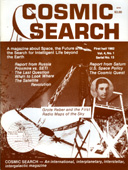![[NAAPO Logo]](../../Images/NAAPOsm.jpg) North American AstroPhysical Observatory (NAAPO)
|
|
The Extrasolar Planetary Foundation Report, The First year
October, 1981 By: George D. Gatewood
This report covers the first year's activities of the Extrasolar Planetary Foundation.
The Extrasolar Planetary Foundation was incorporated under the laws of the Commonwealth of Pennsylvania as a non-profit scientific foundation on September 19, 1980. Its stated purpose is to stimulate and financially support the scientific search for, and subsequent
study of, the planetary systems of other stars. The Foundation is governed by a Board of Directors who serve without pay. Members are Dr. Frank D. Drake, Mr. George C. Fennell, Dr. George D. Gatewood, Dr. Bruce Hapke, Mr. Allen P. Keeley, Dr. Joost H. Kiewiet de Jonge, Mr. C. Thomas Reiland, Ms. Nancy Nowakowski Robinson and Dr. John W. Stein. All members of the Board of Directors are active in various aspects of astronomy. Dr. Drake is a former Director of the Arecibo Radio Observatory and Professor of Astronomy at Cornell
University; Drs. Gatewood and Stein are directly involved in the planet detection effort having developed new instrumentation for astrometric investigations. Dr. Gatewood is also presently serving as the Director of the University of Pittsburgh's Allegheny Observatory. Dr. Hapke has been included on the scientific investigative teams of several interplanetary probes and is a Professor of Geology and Planetary Science at the University of Pittsburgh. Dr. Kiewiet de Jonge is a celestial mechanician and Associate Professor of Physics and Astronomy at the University of Pittsburgh. Also serving without pay are the members of the Advisory Panel, currently made up of Dr. Jane Russell of the University of Iowa and Dr. Allan Walstad of the University of Pittsburgh's Johnstown Campus.
For legal assistance, the Foundation has engaged the services of the respected Pittsburgh law firm of Reding, Rea and Cooper, who besides filing the articles of incorporation have petitioned the IRS for recognition of exemption under section 501 (C) (3) of the Internal Revenue Code. The Foundation has also opened an account with the Mellon Bank of Pittsburgh
and engaged the firm of Merrill Lynch, Pierce, Fenner & Smith as brokers.
Donations to the Foundation are carried in three specific funds, these are 1) Instrumentation, 2) Endowment, 3) Operational. It is Foundation policy that gifts
designated by the donor for specific purposes are set aside for those purposes and are not intermingled with operating, or any other funds. If this is not deemed possible, the gift is returned. The total receipts for the first year were rather impressive, but lopsided: $30,296 in cash, stocks, and equipment.
Gifts for operational expenses were, using our all volunteer staff (only our attorney receives any form of compensation for his services), sufficient for $330 of advertising, $108 for a small mailing campaign, $150 for a mailing list, $234 for brochures, and $127 for office and computer supplies. Legal and incorporation fees totaled $754.
Of the three funds, the one that fared most poorly was the endowment. Perhaps it is reasonable that a new organization should receive most of its contributions as start-up funds, but because it is this constantly growing principal that will give the Foundation the strength necessary to remain a strong influence in the active decades to come, it should not be overlooked entirely.
Our most spectacular success has been the instrumentation drive. Supported largely by a matching gift of up to $20,000 by Dr. Bernard Oliver of the Hewlett-Packard Corporation, we have now raised nearly $24,000 in cash and stock donations for the construction of
the first optical system with an accuracy sufficient to detect other planetary systems. $2,500 of this sum was donated by the CETI Foundation and other smaller donations totaled nearly $1,500. We are planning an additional mailing campaign and are currently in contact
with both the Planetary Society and Delta Vee, Incorporated, in an effort to match more of the funds offered by Dr. Oliver.
With these gifts and private monies received by the University of Pittsburgh, the effort to obtain a new objective lens for the 30-inch Thaw refractor is now within $26,000 of the $129,500 final total of the respective job bids. The largest single gift to this effort to date is only $8,000 larger than that collected so far by our Foundation. With $26,000 left to go, our organization has an opportunity to be the largest single contributor to the very first project related to its specific purpose. Not a bad way to begin.
Additional assistance to the Foundation came in the gift by Drs. Jaylee and Gilbert Mead of the Goddard Space Flight Center, of two small computer systems. The larger of these, complete with a printer, has taken up Foundation record keeping. The second computer is
currently being employed in software development for several computers mounted in the control room of the Thaw refractor. We currently are considering a request from another investigator for a computer terminal with spooling capabilities that this small computer may satisfy.
We would like to finish this report with an excerpt from one of the many letters of
support we have received during our first year:
|
